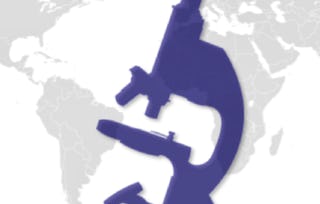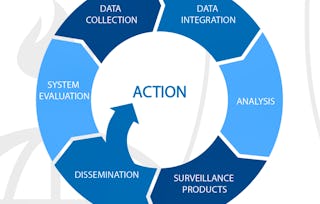In order to make a difference in the health and well-being of a population, we must understand the burden of all problems and conditions that affect the population, as well as how well our efforts to mitigate these problems are actually working. This course provides you with some essential skills and tools that will enhance your ability to describe and understand the health of your community. The tools that epidemiologists use are in fact useful for all public health practitioners, including data scientists, program officials, agency leaders, and policymakers. Whether you are deeply enmeshed in your career and looking to augment your skills, or are looking to change career paths into the field of public health, this course will give you some of the practical knowledge and skills that we hope you can apply in your professional endeavors.

Essential Epidemiologic Tools for Public Health Practice

Essential Epidemiologic Tools for Public Health Practice
This course is part of Epidemiology in Public Health Practice Specialization

Instructor: Aruna Chandran, MD, MPH
62,751 already enrolled
Included with
3,084 reviews
What you'll learn
Be conversant in public health history, services, governance, and workforce.
Perform numeric estimates to assess public health problems and evaluate the burden of a condition in a population
Use data visualization as an epidemiological tool to describe risk factors
Apply basic mapping skills and a tool for epidemiologic descion-making
Skills you'll gain
Details to know

Add to your LinkedIn profile
4 assignments
See how employees at top companies are mastering in-demand skills

Build your subject-matter expertise
- Learn new concepts from industry experts
- Gain a foundational understanding of a subject or tool
- Develop job-relevant skills with hands-on projects
- Earn a shareable career certificate

There are 4 modules in this course
We will start by discussing the definitions of public health and epidemiology and discuss what components of individuals and their lives that we must address in order to optimize their health and well-being. In this section, we will also introduce the hands-on exercise for this course.
What's included
7 videos1 reading1 assignment
In this module, we will examine the definitions for and sources of the core numeric values we need to describe the health and well-being of a population, which are numerators, the counts of an event or disease, and the denominator, the population from which events are drawn. We will then manipulate those numbers to derive ratios, proportions, and rates, which are core measures used to describe the burden of public health problems.
What's included
5 videos1 assignment
In this module, we will explore the tool of data visualization, understand basic components of effective visualizations, and walk through practical exercises of identifying strengths and weaknesses of specific visualizations towards meeting their stated goals. You will then have the opportunity to create a data visualization from data regarding risk factors for common public health problems using the global disease-burden database of the Institute for Health Metrics and Evaluation.
What's included
4 videos1 assignment
Maps and geographic information systems have become a cornerstone in public health and epidemiologic work in all communities. In this module, we will discuss how place matters in public health and how understanding the geographic distribution of a disease or risk factor is an important component of designing appropriate interventions. We will then discuss GIS as a tool for displaying spacial data and conduct a detailed exploration of how spatial data is stored and displayed by GIS software. You will download an open source GIS application known as QGIS, extract both spatial and epidemiologic data from the US Census Bureau, and create a map of your own.
What's included
5 videos1 reading1 assignment
Earn a career certificate
Add this credential to your LinkedIn profile, resume, or CV. Share it on social media and in your performance review.
Instructor

Offered by
Explore more from Public Health
 Status: Free Trial
Status: Free TrialJohns Hopkins University
 Status: Preview
Status: PreviewThe University of North Carolina at Chapel Hill
 Status: Free Trial
Status: Free TrialJohns Hopkins University
 Status: Free Trial
Status: Free TrialJohns Hopkins University
Why people choose Coursera for their career

Felipe M.

Jennifer J.

Larry W.

Chaitanya A.
Learner reviews
- 5 stars
75.32%
- 4 stars
20.36%
- 3 stars
3.08%
- 2 stars
0.74%
- 1 star
0.48%
Showing 3 of 3084
Reviewed on May 12, 2020
Thank you. I have learnt about the basic tools which are essential for public health. Had a great time while learning. But I think exercising QGIS should have a little more information and detailing.
Reviewed on Feb 7, 2021
A very detailed and well conducted course. It helped me in understanding the basics of Epidemiology as well as how to use simple mathematics in solving problems related to public health.
Reviewed on Apr 1, 2020
It was refreshing to go through the course content. I could not go through the fact finder as the website is moved to https://data.census.gov and hence the options too. Thank you for the learning

Open new doors with Coursera Plus
Unlimited access to 10,000+ world-class courses, hands-on projects, and job-ready certificate programs - all included in your subscription
Advance your career with an online degree
Earn a degree from world-class universities - 100% online
Join over 3,400 global companies that choose Coursera for Business
Upskill your employees to excel in the digital economy
Frequently asked questions
To access the course materials, assignments and to earn a Certificate, you will need to purchase the Certificate experience when you enroll in a course. You can try a Free Trial instead, or apply for Financial Aid. The course may offer 'Full Course, No Certificate' instead. This option lets you see all course materials, submit required assessments, and get a final grade. This also means that you will not be able to purchase a Certificate experience.
When you enroll in the course, you get access to all of the courses in the Specialization, and you earn a certificate when you complete the work. Your electronic Certificate will be added to your Accomplishments page - from there, you can print your Certificate or add it to your LinkedIn profile.
Yes. In select learning programs, you can apply for financial aid or a scholarship if you can’t afford the enrollment fee. If fin aid or scholarship is available for your learning program selection, you’ll find a link to apply on the description page.
More questions
Financial aid available,

